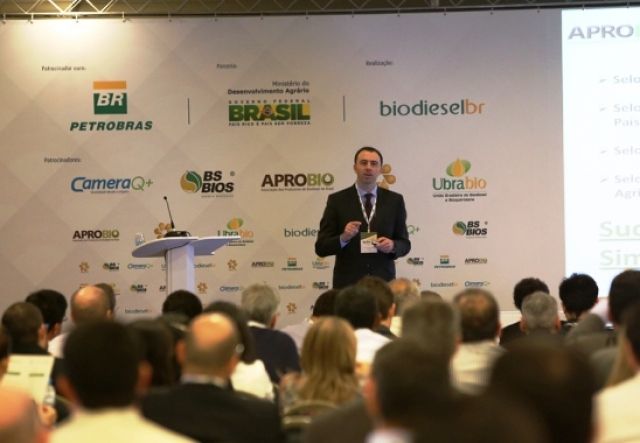News
Go BackThe challenge of the social stamps for plants

The second lecture of the morning of Congress Agribio - "The challenges of the social stamp for plants" - it was presented by the president of the Association of Biodiesel Producers of Brazil (Aprobio) and the chief executive officer of BSBIOS, Erasmo Carlos Battistella.
To him, the results obtained since the launching of the PNPB, allowed to qualify the program as a complete success from the point of view of the structuring of a thriving biodiesel industry in Brazil.
In order to provide support to this assertion, the businessman listed the following numbers on the sector of biodiesel:
• 60 plants working;
• Yearly capacity installed of 2.6 billion liters;
• Turnover of R$ 6 billion last year;
• 1.3 million of jobs in the whole chain;
Like the lecturers that came after him, Battistella agrees that the greatest news introduced by the PNPB was the combination between the production of bioenergy and social inclusion. "Not even the Pro-alcohol had this", he said. When creating new opportunities for small rural producers and settlements of the agrarian reform the program is fair towards the history of Brazilian agriculture. "The stamp is democratic and distributes income. This is innovative", he made a compliment. Nevertheless, he pointed that there is still doubts on the real success of the stamp and that the initiative has not been succeeded enough as it could.
But, according to him, the results have been relevant and growing. Last year, the plants acquired more than 1.9 million ton of grains from the 104 thousand family farmers in Brazil, generating income of more than R$ 1,5 billion to them. In 2012, the result tends to be even more significant, exceeding R$ 2 billion of purchase.
Bonus
But obtaining these results is not exactly painless. According to Battistella, the bonus paid on the price of vegetable oil crops purchased from family agriculture is not exactly popular. "It attacks something sensitive to businessmen: their pocket", he joked by highlighting that its payment became even more difficult after recent changes in the tax policies of biodiesel. In great part, the bonus is a transfer of tax gains which the companies that manufacture their biodiesel from vegetable oil crops from family agriculture have the right for. Even the exemption of the sector being very positive it also reduces the margin for the payment to small producers from R$ 1,38 to R$ 1,15 per sack of soybean acquired. "The companies make their investments in order to have the stamp, but the tax benefits have not compensated", he resumes. He emphasized that the plants pay an average of up to R$ 2,30 per sack.
Polemics
In the presence of several representatives of family agriculture, Battistella has not become intimidated like anybody else in the audience, and he complained. The target was the posture of some cooperatives and unions of farmers. According to him, they ask for additional money at the time of evaluating the contracts with farmers. The practice seems to be spreading through the country, as BiodieselBR informs in conversations with several agents of the sector.
The president of Aprobio defended that the payment of the bonus is turned official soon, or replaced in such a manner that it allows the money to reach the rural producers' pocket without risk of deviating. "That is the objective", he mentioned.
There are still other problems. The lecturer emphasized that it is unfair that non verticalized plants have difficulty to take advantage of these taxes, even when they purchase all raw material demanded by the MDA. Yet, businessmen face difficulties at the time of obtaining tax credits which the lecturer has classified as "rot".
DAP
In order to try to reduce part of the difficulties of the sector, the lecturer complained that the ministry could turn the inclusion of other rural cooperatives as suppliers of the industry easier. Today, only cooperatives which have legal DAP can be suppliers of plants, and this demands that 70% of their cooperative own the DAP. This excludes many family farmers affiliated to cooperatives, but not fit the rules, or even those who prefer not to sell their production through cereal farmers. "This is excluding. We cannot exclude these producers", he says. The rule reduces the base of producers that may be included and increases the competition for the product, inflating the prices.
Battistella considers that if it is improved, the stamp could even be seen as a differential of Brazilian biodiesel in the international market. "We are exporting soybean in natura, then, why not to take advantage of the industrial park? The plants should have the stamp for export", he defends.
"The productive chain is prepared to the next step. Its internal and external market has grown. We have conditions and raw material. We are favorable to the stamp, but we need to implement adjustments so that it continues to be successful", he said.
Source: Fábio Rodrigues - BiodieselBR.com




